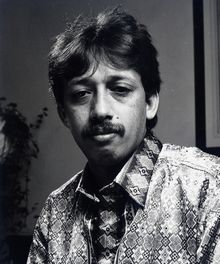The struggle for Indonesian human rights begun by the nation’s most famous activist, Munir Said Thalib, lives on. To remember him, there's now a museum. By I Gede Robi Supriyanto.
Denpasar, 21 December 2013. It has been nine years since Munir was murdered on an international flight to Amsterdam. While the ‘case’ of Munir is not completely resolved his family have recently opened a Museum honoring his life, his life’s work and the work that continues today: to keep the people of the country free from civil and human rights abuses.

Munir came from humble beginnings. Born Munir Said Thalib in Malang, East Java on December 8th, 1965, he was known for his principles of non-violence, even toward the perpetrators of violence. His colleagues and friends say Munir was strongly influenced by the teachings of Gandhi and practiced his insistent “hate the sin and not the sinner”.
His work gained global attention and received prestigious awards, including the Swedish Right Livelihood Award in 2000, for his dedication in the improvement of human rights and civil control of the military.
“I believe a regime that uses violence is a corrupt regime… So, when our country uses violence, it proves itself to be a corrupt regime.” – Munir, July 1998
Killed by poison
Munir’s assassination case has still not seen true justice. The only perpetrator brought to trial was the pilot on the flight, Pollycarpus. He was initially sentenced to 20 years in prison, now reduced to fourteen. As the only person charged with the death of Munir by poisoning with arsenic, Pollycarpus is believed to be the fall-man, while the real perpetrators behind Munir’s assassination are still free.
Munir’s death was the final conclusion to a series of attacks and a concerted effort to terrorise him throughout his time as director of Kontras (Komisi untuk Orang Hilang dan Korban Tindak Kekerasan – Commission for the Disappeared and Victims of Violence), a non-governmental organisation for missing persons, those who have been “disappeared”, and victims of political violence. During his time at Kontras Munir was repeatedly terrorised but it left him unperturbed and more dedicated to the cause - and his dedication to the cause never wavered.
“Broken computers and glass do not in any way compromise the mandate that Kontras follows: to investigate human rights crimes in this country. We will continue to work as usual,” Munir told Kompas on March 14th 2002. “There will always be a reaction towards human rights advocacy. That is our challenge. You need not hold too much anger against the people who attacked Kontras. We must educate this nation to not only react with violence, because in violence our nation will never be great,” he added.
Munir was a small man in stature, but his bravery could be measured in mountains. Today he is the inspiration of many Indonesian human rights advocates who are following in his footsteps. He is a hero to those seeking justice for their people and their land, demanding worker’s rights and protesting over development and the destruction of the forests.
With Mandela
In his hometown of Malang, a small university town in the hills of East Java, Munir’s widow Suciwati oversaw the opening of the Omah Munir (House of Munir) dedicated to her husband’s memory on the day of Nelson Mandela’s passing.
“Today heaven is busy receiving Nelson Mandela,” she said while tending the gravestone. “I’m sure Munir is happy there, hanging out with Mandela,” she added. In this case, the saying ‘behind every great man, there is a great woman’ is never more true. Suciwati, better known as M’bak Suci, with her two children, continues to fight for justice for Munir.
She was originally an activist for farmer and peasants’ rights, and now continues her husband’s cause. Together they started a grass roots campaign “Menolak Lupa” (Refuse to Forget) which has gained wide support from youth and popular culture in Indonesia.
Munir made choice to live a simple life: “This is a life choice. I avoid a life of irony, where people are still in poverty, but I live a life of luxury. Or if my colleagues at Kontras, or other organizations, live simple lives and face high risks, I must not live a different way than them. That would destroy what we are fighting for, which is a more fair process for the lives of our people,” he said.
With the opening of the museum and the recent documentation of Munir’s life in film and song the hope of many Indonesians lies in his words as Indonesians cast their votes for their next Presidental leader:
“What we must fear most is fear itself, because fear distorts our judgment.”
Omah Munir: The museum is located at Jl. Bukit Berbunga No. 2, Kota Batu, Malang, East Java, and is made up of four main rooms which display the history of Munir and his work. It documents the history of crimes against human rights since the New Order Regime in Indonesia began, cases of human rights violations and missing people, as well as what Munir left behind, including some physical items, and also his ideology. The museum was founded to provide information and documentation regarding advocacy for human rights and justice in Indonesia. Besides a place to remember Munir as an icon of Human Rights activism in Indonesia, the museum also hopes to serve as an alternative place of learning for future human rights activists, students and the general public.
